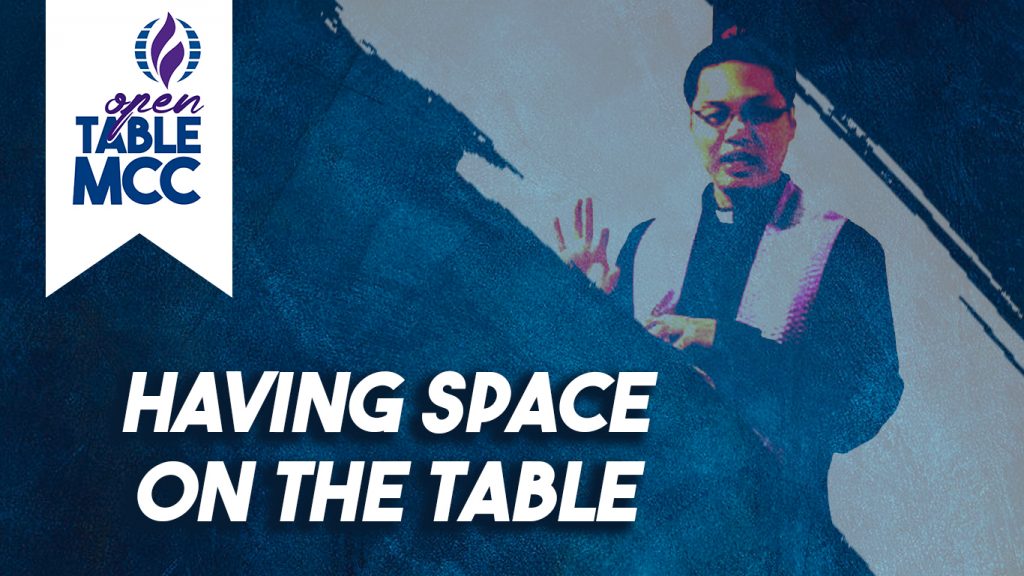Listen to last Sunday’s preaching, as MPPuzon speaks about “Having Space on a Table”.
Also available as a blog post.
Reading: Luke 14:7-14
When he noticed how the guests picked the places of honor at the table, he told them this parable: “When someone invites you to a wedding feast, do not take the place of honor, for a person more distinguished than you may have been invited. If so, the host who invited both of you will come and say to you, ‘Give this person your seat.’ Then, humiliated, you will have to take the least important place. But when you are invited, take the lowest place, so that when your host comes, he will say to you, ‘Friend, move up to a better place.’ Then you will be honored in the presence of all the other guests. For all those who exalt themselves will be humbled, and those who humble themselves will be exalted.”
Then Jesus said to his host, “When you give a luncheon or dinner, do not invite your friends, your brothers or sisters, your relatives, or your rich neighbors; if you do, they may invite you back and so you will be repaid. But when you give a banquet, invite the poor, the crippled, the lame, the blind, and you will be blessed. Although they cannot repay you, you will be repaid at the resurrection of the righteous.”
“Ano ba ang kailangan ko isusuot? Ano ba ang kailangan ko dadalhin? Saan ba ako dadaan para hindi ako ma-late? Magdramatic entrance kaya ako? Makikita ko kaya siya?”
We have heard countless tragic anecdotes and funny stories or even experienced firsthand at the banquets and parties were invited to: Arriving overdressed or inappropriate to an event, the realistic shock from realizing that there are four of you wearing the same designer outfit, wearing the same material, color and pattern of the blouse is same as the table cloth, two mortal enemies making “beso-beso” for the world to see, the lone guest seated around a table with people who come from one company, seated on the same table as your ex because you were friends from college…
This Sunday’s reading appear to us as very sound advice from 2000 years ago for the invited and the ones inviting to a feast. In today’s rules of hosting formal dinners, birthday parties or wedding banquets, we have ushers to guide guests to their particular seats – with listings and seating arrangements meticulously made in advance by the wedding planner. The situation described by Jesus – of being reseated after presumably sitting at the place of honor – is certainly a humiliating, disgraceful outcome. And yes, why would you invite people you don’t know or like to your party? Unless of course you are someone running for public office.
The more important questions here – given the 2000-year old parable on hosting banquets – are first, “Do I have space on the table?” What does it take to have space on the table?”
For last three or four weeks, we have been taking about how we changed our church’s identity and name – the logic and prayerful, soulful renaming from one that is geographically limiting to a newer one that reflects our three missions. For two Sundays, we have been holding services at our new home here at NCCP. Attendance is encouraging, with new and old faces, messages are hopeful and inspiring, and I would like to say – at least from my end – the change in atmosphere is bringing a lot of good to me.
From today’s reading, I would like to equate “having space on the table” with three important elements on what that encompasses “space”. Verses 7-10 point to first element. Can anyone guess what it is? “Places of honor? Respect? Proper placing? Deserving recognition? Usurpation? Ranks?”
Certainly, while we do have church officers, lay leaders and an administrative pastor, who gets to sit at the “kabisera” or the head of the table and along side the “kabisera”? Who gets to sit at the right, or the left? I am reminded of the banquet scene in Noli Me Tangere, the novel of our national hero that so inflamed the friars, where Padre Damaso was incensed to be served a plate of tinola with just the “neck and wing”.
With reference to “having space on the table”, the underlying message from verses 7-10 is “humility”. “Having space on the table” is knowing that we are seated here not because of our corresponding role, rank or contribution to the church – we are seated here simply because we have been called. We have been invited means there is space for us, and parodying from that famous movie line from a Spider-Man movie, “with space” comes “humility”.
So, do I have space on the table? Yes, but remember those who cannot join us around the table and those who prefer to stay “under the table” because they have yet to come to terms with their faith journey and sexuality – those who cannot come out due to fear of rejection or ridicule and persecution. Remember those who cannot have tables of their own and those who do not know that tables like ours can exist for them.
The second element on what it means to “have space on the table” can be seen from the remaining verses: “selfless service”.
Invite the poor, the crippled, the lame, and the blind, and I would like to believe that these conditions are not just limited to those who have physical disabilities. We can be made poor by our harmful and unhealthy thoughts, we can be crippled by our biases and poor self-value and judgement, we can be rendered lame by our unrealistic expectations from others and from ourselves, and we can be blinded by non-inclusive beliefs, political views, and lifestyles. Would you lend your time and money to someone who cannot repay you?
Space on the table eventually means serving others, in any capacity… For mahjong players, there is a saying “serve your wall” – you help divide the tiles that are in front of you to fellow players. Mahjong players who do not serve their walls get eye. But does that mean that I am required to serve since I have space on the table? While I would like to have a straightforward YES and NO answer, my response is: “What does your heart tell you?” We have heard or seen many “pay it forward” narratives, but it all boils down to how “having space on the table” may bring us to realize that even the greatest Master who lived was not here to be served but to serve.
By way of analogy, does all this merely mean passing the salt, or catsup or whatever condiments to the other end of the table? It may mean getting out of your seat and heading to the kitchen once you realized that we need more catsup, salt or chili flakes, that there may be people who would want second helpings. It is also important as host to know that certain guests are allergic to seafood or other ingredients – and certainly you wouldn’t force them to eat these items.
“Having space on the table” eventually means seeing how the Great Host gave himself up – body and blood, serving selflessly and with all humility. Certainly, Jesus had the power to strike down dead all the Pharisees if he wanted to, but he even ate with one of them. He could just have dined with the wealthiest of kings and emperors, but chose to be with the cripple, lame, blind, and the poor.
The last element in what it means to “have space on the table” is “reward” – a repayment that is worth than anything on this Earth – to be repaid in the resurrection of the righteous. No words can perhaps capture that day, and I cannot even imagine what would it be like to be “repaid” for having maintained space for the table for others with humility and selfless service. I would like to believe that just as the Kingdom of God is here and now, part of these “rewards” are here – and I don’t mean to dwell on the material aspects of such rewards: to have cultivated wonderful gifts such as “love, joy, peace, forbearance, kindness, goodness, faithfulness, gentleness and self-control”.
Let me end today’s preaching with words from the Bhagavad Gita, one of the sacred books from the world’s oldest religion, which even predates Jewish tradition.
“Living creatures are nourished by food, and food is nourished by rain; rain itself is the water of life, which comes from selfless worship and service.”
–Bhagavad Gita, 3.14
Preaching by MPPuzon
Podcast: Play in new window | Download
Subscribe: Apple Podcasts | Spotify | RSS



